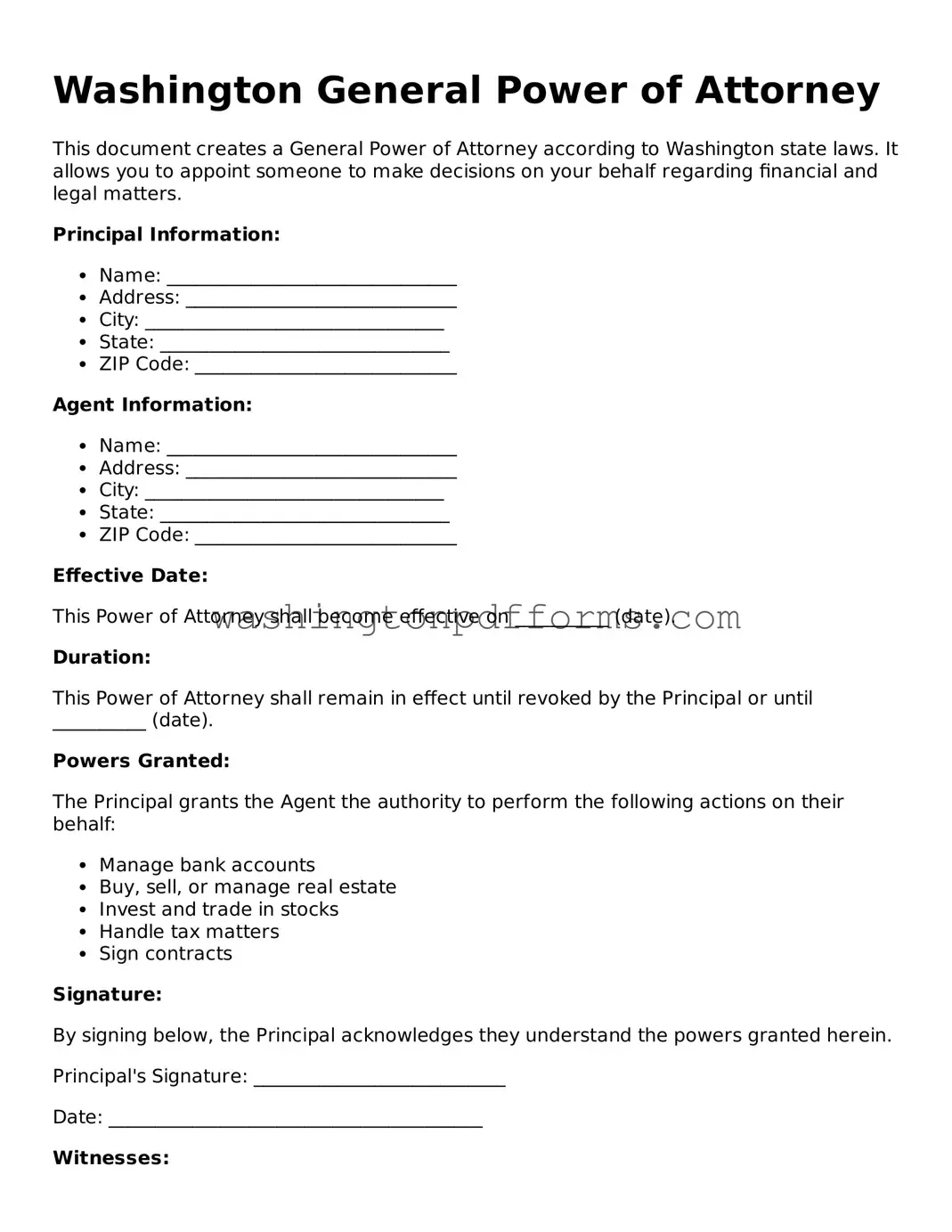Attorney-Approved Washington General Power of Attorney Template
The Washington General Power of Attorney form is a crucial legal document that allows individuals to appoint someone they trust to make decisions on their behalf. This arrangement can be particularly important in situations where a person may become incapacitated or unable to manage their affairs. The form grants broad authority to the appointed agent, covering various aspects such as financial matters, real estate transactions, and legal decisions. It is essential for individuals to understand the implications of this document, including the responsibilities it places on the agent and the potential risks involved. Additionally, the General Power of Attorney can be tailored to fit specific needs, allowing for limitations or specific powers to be included. Understanding how to properly execute and revoke this form is vital for ensuring that it serves its intended purpose effectively. By being informed about the Washington General Power of Attorney, individuals can take proactive steps to safeguard their interests and ensure their wishes are respected in times of need.
Common mistakes
Filling out a General Power of Attorney form in Washington can be straightforward, but there are common mistakes that individuals often make. One of the most frequent errors is failing to clearly identify the principal and the agent. The principal is the person granting authority, while the agent is the person receiving it. If names are misspelled or if there is ambiguity in identifying these parties, it can lead to confusion and potential legal issues.
Another mistake is not specifying the powers granted to the agent. The form should clearly outline what decisions the agent can make on behalf of the principal. If the powers are too vague or overly broad, it may create problems later. It is essential to be specific about financial, legal, and medical powers to avoid misunderstandings.
People also often forget to date the document. A date is crucial as it establishes when the authority begins. Without a date, it can be difficult to determine the validity of the powers granted, especially if disputes arise later. Additionally, failing to sign the form can render it invalid. Both the principal and the agent should sign the document where required.
Another common oversight is neglecting to have the document notarized or witnessed, if required. In Washington, notarization is typically necessary for a General Power of Attorney to be legally binding. Without proper notarization, the form may not be recognized by financial institutions or other entities.
Some individuals may not consider the implications of granting power to their agent. It is vital to choose someone trustworthy and to discuss the responsibilities involved. Failing to communicate expectations can lead to misuse of the granted authority, resulting in financial or personal harm.
People sometimes overlook the importance of reviewing the document after it is completed. Changes in circumstances, such as a change in health or financial status, may necessitate updates to the Power of Attorney. Regularly reviewing the document ensures it remains relevant and effective.
Additionally, individuals may forget to provide copies of the completed form to relevant parties. Once the General Power of Attorney is executed, it is important to share copies with the agent and any institutions that may need to recognize the agent’s authority. This ensures that the agent can act on behalf of the principal without delay.
Finally, some may not understand the need for revocation of a Power of Attorney when it is no longer needed. If circumstances change or if the principal wishes to appoint a new agent, it is crucial to formally revoke the previous Power of Attorney. Failing to do so can lead to confusion and potential legal complications.
Similar forms
- Durable Power of Attorney: This document allows an individual to appoint someone to manage their financial and legal affairs even if they become incapacitated. Like a General Power of Attorney, it grants broad authority but remains effective under specific circumstances.
- Limited Power of Attorney: This form provides authority to an agent for specific tasks or a limited period. While a General Power of Attorney offers wide-ranging powers, a Limited Power of Attorney restricts the agent's authority to particular actions.
- Healthcare Power of Attorney: This document designates an individual to make medical decisions on behalf of another person. Similar to a General Power of Attorney, it allows someone to act on behalf of another, but it focuses specifically on healthcare matters.
- Living Will: A Living Will outlines a person's wishes regarding medical treatment in case of incapacitation. While it does not appoint an agent like a General Power of Attorney, it serves to communicate preferences about medical care.
- Trust Agreement: A Trust Agreement allows a person to transfer assets to a trustee for management on behalf of beneficiaries. Both documents involve delegating authority, but a Trust Agreement focuses on asset management rather than legal or financial decision-making.
- Bill of Sale: This document is essential for recording the sale of personal property, such as vehicles and equipment. For more information, visit https://topformsonline.com/texas-bill-of-sale/.
- Will: A Will specifies how a person's assets should be distributed after their death. While a General Power of Attorney is effective during a person’s lifetime, a Will takes effect upon death, addressing the distribution of property rather than decision-making authority.
Some Other Washington Templates
Free Printable Durable Power of Attorney Form Washington State - A Durable Power of Attorney can be revoked at any time as long as you are competent.
Odometer Disclosure Statement Washington - This form makes it easier to handle vehicle sales, purchases, or related matters with appointed authority.
To properly navigate the application process for the California Department of Motor Vehicles (DMV) DL 44 form, individuals can find helpful resources at smarttemplates.net, which offers guidance on accurately completing this essential document for acquiring or renewing driver's licenses or identification cards in California.
Polst Form Pdf - A statement of preference aimed at avoiding unnecessary suffering during health crises.
